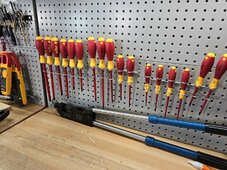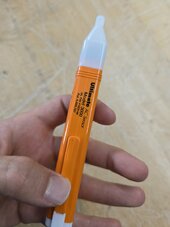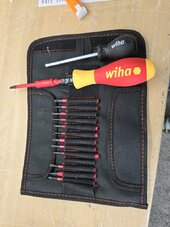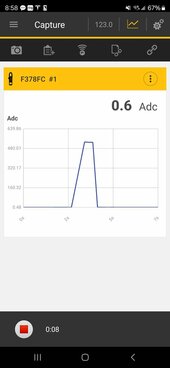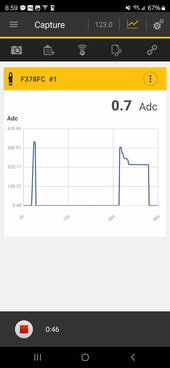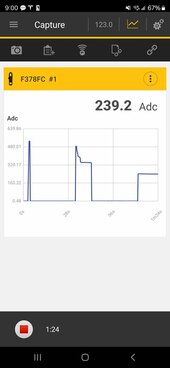You are using an out of date browser. It may not display this or other websites correctly.
You should upgrade or use an alternative browser.
You should upgrade or use an alternative browser.
Wiha!!!
- Thread starter Will Prowse
- Start date
Heh...
I am a licensed electrician...
I use a simple milwaukee multi blade screwdriver for 99% of my screws.
I do have a ton of ideal insulated screwdrivers, but rarely need them.
Most everything I work is powered down during handling.
I am a licensed electrician...
I use a simple milwaukee multi blade screwdriver for 99% of my screws.
I do have a ton of ideal insulated screwdrivers, but rarely need them.
Most everything I work is powered down during handling.
I do have a few wiha special tools.
Offgrid Jungle
New Member
Throw that voltage tickler away. The only way they fail is to provide a false “no voltage” indication. They are not allowed on any of my job sites. They are killers.
yodamota
Solar Enthusiast
haha what about a https://www.kmstools.com/wera-sd-44-safe-torque-speed-2-6-nm.html
bolhuijo
TechnoGeezer
Wiha are the only screwdrivers I will buy for tiny Philips #1, #0, #00, etc. I'm in laptops all the time and they work perfectly.
I use mine as a preliminary check, after testing it on a known live circuit first. I still will poke with a meter or other contact tester before grabbing stuff.Throw that voltage tickler away. The only way they fail is to provide a false “no voltage” indication. They are not allowed on any of my job sites. They are killers.
Sadly wiha moved production to Vietnam before that they were extremely good tools but the quality has dropped a fair bit not to say they aren't still a pretty high standard.Made a community post on my YouTube asking people why they would spend so much for these screwdrivers. Now I have the whole collection
View attachment 230364View attachment 230365View attachment 230366
Not sure of the price difference in the US but I'd highly recommend trying a Wera set next the slim insulation is a god send when disassembling recessed screws and they do some fancy laser etching on the tips to make them grip a screw better.
Many service electricians end up removing a large portion of insulation on most screwdriver for recessed screws which then breaks code as far as OSHA/health & safety(doubt your that worried) so Wera is literally the only option to get the job done without getting kicked off site.
Next thing is buy some cobalt step drills is see that "Titanium" one hanging in your peg board the fluke meters likely think riff raff have moved in next door.
Oh wow that's good to know and very unfortunate. Darn it!! I will check out that brand next thank youSadly wiha moved production to Vietnam before that they were extremely good tools but the quality has dropped a fair bit not to say they aren't still a pretty high standard.
Not sure of the price difference in the US but I'd highly recommend trying a Wera set next the slim insulation is a god send when disassembling recessed screws and they do some fancy laser etching on the tips to make them grip a screw better.
Many service electricians end up removing a large portion of insulation on most screwdriver for recessed screws which then breaks code as far as OSHA/health & safety(doubt your that worried) so Wera is literally the only option to get the job done without getting kicked off site.
Next thing is buy some cobalt step drills is see that "Titanium" one hanging in your peg board the fluke meters likely think riff raff have moved in next door.
Just looked them up, surprisingly the full kraftform set doesn't look that expensive there it's comparable to the wiha if your ok with the interchangeable blades.Oh wow that's good to know and very unfortunate. Darn it!! I will check out that brand next thank you
OzSolar
Whatever you did, that's what you planned.
They aren't killers. They are very useful tool in the hands of someone who knows how to use them.Throw that voltage tickler away. The only way they fail is to provide a false “no voltage” indication. They are not allowed on any of my job sites. They are killers.
For starters, only use it to prove power is there, not to prove power isn't there.
I don't leave home without that exact same model but 99% of my life is troubleshooting. No power button, it's always on so you don't have remember to turn it on or wonder if it's timed out and turned itself off.
I will say that I'm pretty sure tried every other model and found them be crap, so no argument there. Power buttons that require to you to push them twice or hold them down longer to get to special features only confuse things.
Q-Dog
¯\_(ツ)_/¯
I use mine to trace live circuits. Very helpful when working alone in the attic. I ALWAYS verify with a meter before working on a circuit, but I'm also a big chicken when it comes to electrickery.Throw that voltage tickler away. The only way they fail is to provide a false “no voltage” indication. They are not allowed on any of my job sites. They are killers.
I can afford them but I don't do enough electrical work to justify special screwdrivers.
Bluedog225
Solar Wizard
Ya known, I don’t have a Rivian. Just sayin. 
Suijkerbuijk
I cannot be held responsible for this information.
Offgrid Jungle
New Member
In my industry they are not allowed (generator installations). I have nationwide experience with AHJ's, clients, and safety officers. They aren't even allowed on many sites. Read thru the comments and then reflect on what they are actually used for by the responders here. Totally useless and unsafe.They aren't killers. They are very useful tool in the hands of someone who knows how to use them.
For starters, only use it to prove power is there, not to prove power isn't there.
I don't leave home without that exact same model but 99% of my life is troubleshooting. No power button, it's always on so you don't have remember to turn it on or wonder if it's timed out and turned itself off.
I will say that I'm pretty sure tried every other model and found them be crap, so no argument there. Power buttons that require to you to push them twice or hold them down longer to get to special features only confuse things.
Offgrid Jungle
New Member
Food for thought... pen tester, tic tester, sniffer, widowmaker
going_commando
New Member
I'm more of a Wera guy than a Wiha guy. The insulated interchangeable shank kit is amazing. I've been using it for years.
As far as non-contact voltage testers go, I've been using Fluke for years, and I've gotten plenty of false positives, but never a false negative. I am a master electrician and usually keep mine in my pocket, and if I'm actually grabbing onto something I double check with a wiggy-type tester (for AC circuits).
Also, I've been noticing more Fluke meters popping up on youtube. If you have that clearish looking button on the clamp meter (or any others), that is the fluke connect button. Download the app, connect to the meter with bluetooth, and you can do graphing so it shows peaks and basically is a recording meter. I use one all the time for testing motors and such, absolutely love it. The range is amazing also, I can have the meter in a metal cabinet, and still connect at 50+ feet away.
As far as non-contact voltage testers go, I've been using Fluke for years, and I've gotten plenty of false positives, but never a false negative. I am a master electrician and usually keep mine in my pocket, and if I'm actually grabbing onto something I double check with a wiggy-type tester (for AC circuits).
Also, I've been noticing more Fluke meters popping up on youtube. If you have that clearish looking button on the clamp meter (or any others), that is the fluke connect button. Download the app, connect to the meter with bluetooth, and you can do graphing so it shows peaks and basically is a recording meter. I use one all the time for testing motors and such, absolutely love it. The range is amazing also, I can have the meter in a metal cabinet, and still connect at 50+ feet away.
Good to knowThrow that voltage tickler away. The only way they fail is to provide a false “no voltage” indication. They are not allowed on any of my job sites. They are killers.
I had no idea about the connect button! Holy cow that's amazing!I'm more of a Wera guy than a Wiha guy. The insulated interchangeable shank kit is amazing. I've been using it for years.
As far as non-contact voltage testers go, I've been using Fluke for years, and I've gotten plenty of false positives, but never a false negative. I am a master electrician and usually keep mine in my pocket, and if I'm actually grabbing onto something I double check with a wiggy-type tester (for AC circuits).
Also, I've been noticing more Fluke meters popping up on youtube. If you have that clearish looking button on the clamp meter (or any others), that is the fluke connect button. Download the app, connect to the meter with bluetooth, and you can do graphing so it shows peaks and basically is a recording meter. I use one all the time for testing motors and such, absolutely love it. The range is amazing also, I can have the meter in a metal cabinet, and still connect at 50+ feet away.
OffGridForGood
Catch, make or grow everything you can.
I recall working with an electrician long long ago when I was young, a couple thousand years ago,
he had a piece of phone-wire sized wire with alligator clamps on each end he kept around his neck most of the time, kinda like a doc with a stethoscope.
When he did work on a panel he checked it was off and with a meter, but then clamped the tiny wire across live to ground before he started working on the panel.
I didn't ask at the time, but always thought after - if power was ever present that small wire would pop in a second so that must have been his final 'if all else fails test' - back then I don't remember any lock-out-tag-out ...guess he had his reasons.
he had a piece of phone-wire sized wire with alligator clamps on each end he kept around his neck most of the time, kinda like a doc with a stethoscope.
When he did work on a panel he checked it was off and with a meter, but then clamped the tiny wire across live to ground before he started working on the panel.
I didn't ask at the time, but always thought after - if power was ever present that small wire would pop in a second so that must have been his final 'if all else fails test' - back then I don't remember any lock-out-tag-out ...guess he had his reasons.
going_commando
New Member
I love it. Here's a screenshot of a motor i was testing while it was running last year. I always forget to take screenshots, but this will give you an idea of what you can do.I had no idea about the connect button! Holy cow that's amazing!
Attachments
I cannot freaking believe it. Just got home and downloading app. So much easier than using scope and shunt etc
Hedges
I See Electromagnetic Fields!
- Joined
- Mar 28, 2020
- Messages
- 21,981
As far as non-contact voltage testers go, I've been using Fluke for years, and I've gotten plenty of false positives, but never a false negative. I am a master electrician and usually keep mine in my pocket, and if I'm actually grabbing onto something I double check with a wiggy-type tester (for AC circuits).
We were warned about wiggy blowing up.
Searching the topic I find:
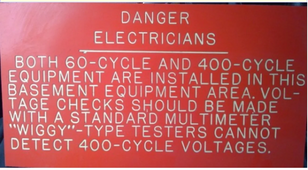
"Didn’t blow up in my hand but saw an engineer tap it to the primary of a 4160 transformer.
Lucky it shot past his head."
Wiggy rail gun!
"480V Arc Flash"?
Looks more like "Arc Blast" if you ask me.
I thought Arc Flash was a really bad sunburn.
This one they called Arc Flash too:
The flash is the photons (you know, what this forum is about.)
The blast is the shock wave, debris, plasma (like a mini CME)
I use mine to trace live circuits. Very helpful when working alone in the attic. I ALWAYS verify with a meter before working on a circuit, but I'm also a big chicken when it comes to electrickery.
Seems like a good, safe use.
But might need something disguised so as to not run afoul of the safety rules.
Throw that voltage tickler away. The only way they fail is to provide a false “no voltage” indication. They are not allowed on any of my job sites. They are killers.
Yeah they are insane. I just bought an arc shield face mask yesterday. Absolutely ridiculous amount of energyWe were warned about wiggy blowing up.
Searching the topic I find:
View attachment 230533
"Didn’t blow up in my hand but saw an engineer tap it to the primary of a 4160 transformer.
Lucky it shot past his head."
Wiggy rail gun!
"480V Arc Flash"?
Looks more like "Arc Blast" if you ask me.
I thought Arc Flash was a really bad sunburn.
This one they called Arc Flash too:
The flash is the photons (you know, what this forum is about.)
The blast is the shock wave, debris, plasma (like a mini CME)
Seems like a good, safe use.
But might need something disguised so as to not run afoul of the safety rules.
Similar threads
- Replies
- 17
- Views
- 642
- Replies
- 13
- Views
- 450



